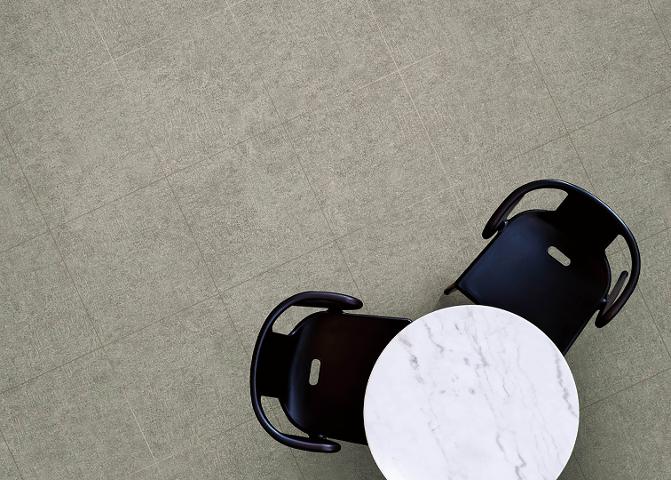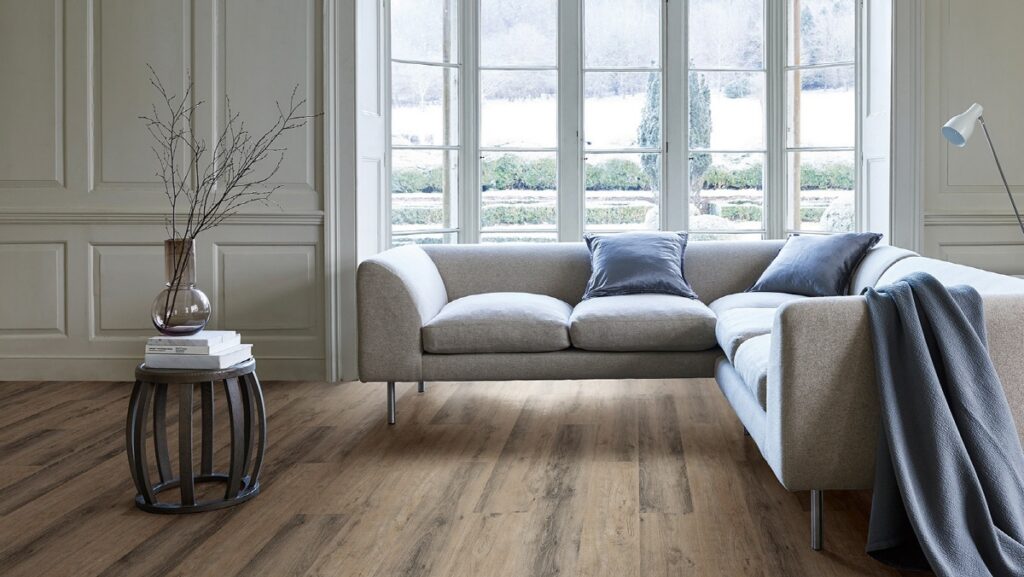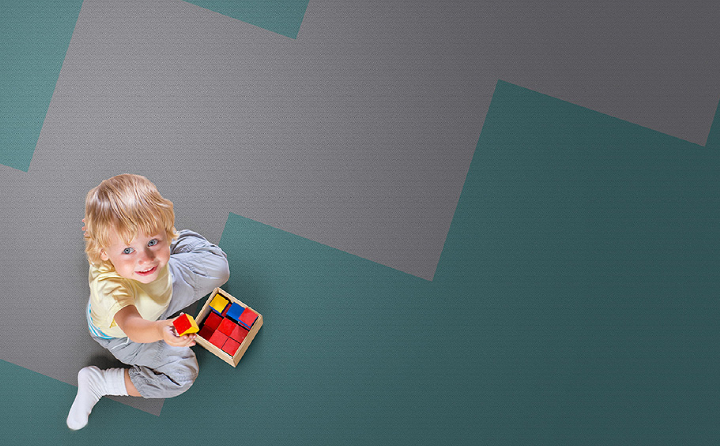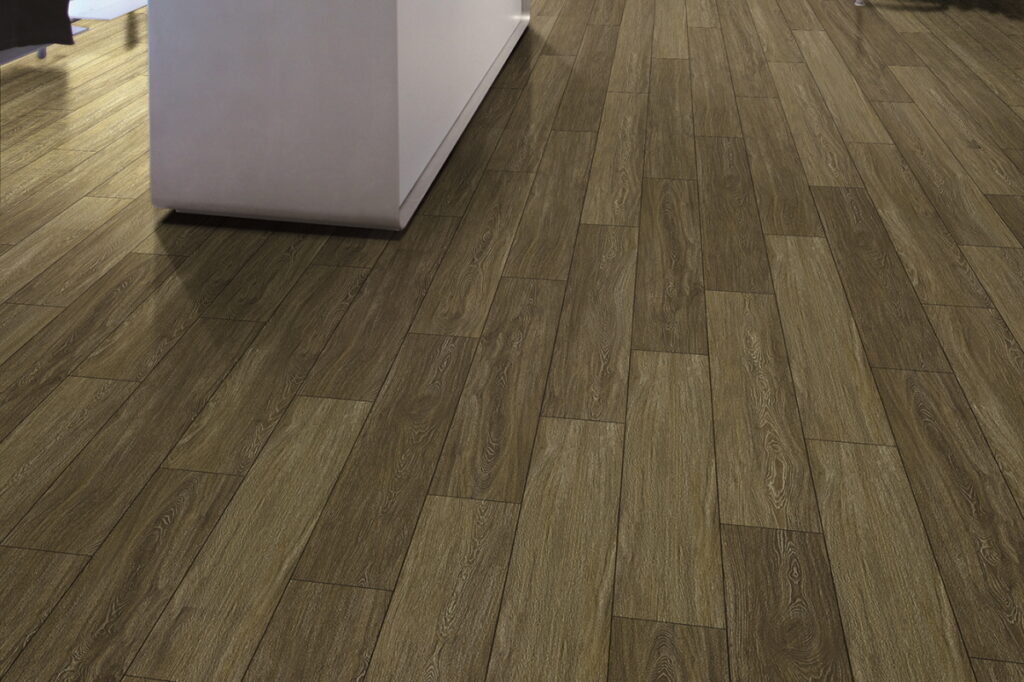
Durability is a top priority for anyone looking for new flooring. Whether you’re a homeowner or a commercial designer, product longevity, durability, and performance factors can sway your decision. When you’re looking for a new floor, you’ll want to know how long the flooring will last before you have to replace it. To determine that, you’ll need to understand how the flooring holds up in certain situations. For example, how does it resist stains, scratches, cracking, and other potential damage? This article will focus on the durability of vinyl flooring, including its projected lifetime, the manufacturing processes that contribute to its durability, specific pros and cons, repair techniques, and how to extend the lifespan of vinyl flooring.
Vinyl Flooring Durability
Let’s start by addressing the elephant in the room. Hardwood and natural stone floors last much longer than vinyl floors, so why should you choose vinyl? While some other flooring materials may last longer, vinyl floors offer several advantages over these other flooring options, including cost, ease of installation, and maintenance. Additionally, vinyl flooring can outlast many competitors, such as laminate.
With professional installation and regular care, it’s common for vinyl flooring to last 20 years, depending on the quality of the product and its configuration. Vinyl flooring comes in several formats, including tile and plank. Generally speaking, vinyl sheet flooring will last anywhere from 10 to 20 years, while vinyl plank and tile flooring will last 15 to 20 years. The thickness of its wear layer vastly impacts vinyl flooring’s lifespan, so pay attention to this detail when purchasing your flooring. Installation, maintenance, and the amount of usage and foot traffic also factor in the floor’s longevity. When looking for vinyl flooring, we suggest sticking with reputable manufacturers that offer luxury vinyl tiles and planks with thicker wear layers and protective elements.
What is vinyl flooring made of?

Vinyl flooring is made by using two different kinds of reinforced plastic, PVC and fiberglass. These plastics enhance the flooring’s durability by preventing the product from breaking down due to natural causes. Vinyl flooring has three layers: the base layer, the design layer, and the surface layer. The base layer is laid directly on your subfloor, providing protection and cushion to the other layers. The design layer gives your vinyl the color, design, pattern, and character you are looking for, while the wear layer of your vinyl floor protects the design layer from stains, scratches, and wear.
Vinyl Flooring Pros and Cons

Here’s a summary of some of the advantages and disadvantages of using vinyl flooring.
· Advantages of Vinyl Flooring
- Affordability – Vinyl flooring is generally less expensive per square foot than other flooring solutions, such as wood, granite, or marble. It also costs less to install, especially non-adhesive vinyl flooring that clicks into place.
- Low maintenance – Vinyl flooring requires little maintenance other than routine sweeping and mopping. Spills can be wiped up easily, and you won’t have to invest in special cleaners or equipment to keep your floors clean.
- Waterproof – Most vinyl flooring includes a waterproof layer. Unlike wood and stone, high-quality vinyl is non-porous and can resist spills and prevent moisture from penetrating the surface.
- Customizable appearance – There are many options to choose from when deciding how you’d like your floor to look, from mimicking natural flooring options like hardwood floors to trendy patterns that evoke an urban feel and look like concrete. The high-resolution options in vinyl flooring provide a full array of on-trend and traditional colors and patterns to fit any space and style, from residential kitchens to commercial cafes, healthcare facilities, or retail shops.
- Durability – Vinyl flooring lasts longer than several other types of flooring and is resistant to damage and cracking. It is more flexible than other options and can absorb the impact of heavy objects being dropped on it. High-quality vinyl may also have an enhanced base layer to improve shock absorption and comfort underfoot.
- Ease of installation – Vinyl flooring is often extremely easy to install compared to other types of flooring. Brands with click-lock joints or peel-and-stick backings make vinyl flooring installation possible for many DIYers. Even when you choose professional installation, vinyl flooring can cost less than half the price of hardwood floors and ceramic tiles for installation.
· Disadvantages of Vinyl Flooring
- Cannot be repaired – Vinyl flooring is tough to repair, and replacement of the damaged area is usually necessary. However, replacing worn or damaged tiles and planks is easy if you choose vinyl floors with click-and-lock technology. Simply remove the affected tiles and planks and replace them with new ones.
- Can emit volatile organic compounds – Vinyl flooring emits gasses that can impact your health and damage the environment during installation. The gasses are especially hazardous to those with respiratory problems. To prevent issues, make sure your space is well ventilated during installation.
- Shorter lifespan than wood or natural stone floors – As previously discussed, vinyl has a shorter lifespan than wood or stone floors. However, other advantages may outweigh lifespan considerations. If you know you’ll replace your flooring as trends change, then vinyl flooring can be an excellent choice.
- Difficult to remove – Removing vinyl flooring can be challenging if an adhesive substance is used during installation. However, luxury vinyl tiles with click-and-lock technologies make this process much more manageable.
- Not eco-friendly – These floors are made from plastics that prevent them from breaking down, so they take years to decompose. Additionally, recycling companies don’t consider vinyl a profitable enterprise, so they’re likely to reject the used vinyl materials.
Vinyl Flooring Thickness of Wear Layer
When purchasing vinyl flooring, it is important to pay attention to the thickness of the wear layer because it protects the flooring from daily wear and damage, such as stains and scratches. In general, the thicker the wear layer, the longer your vinyl flooring will last. You should also consider where in your home you are installing vinyl flooring. We recommend choosing tiles with thicker wear layers for high-traffic areas.
How often should you repair or replace vinyl flooring?
It is hard to predict precisely how long your vinyl flooring will last. Typically, you can expect it to last anywhere from 10 to 25 years. The estimated lifespan varies because the vinyl flooring’s durability truly depends on the type, brand, and quality you choose to install. Additionally, how well the floor is maintained can significantly impact its lifespan.
If there is visible damage and you have a click-and-lock product, removing the damaged sections won’t take long to replace. For minor scuffs and scratches, you can use a liquid seam sealer or vinyl flooring repair kit to disguise the blemish; depending on your skill level, these repairs can take less than an hour to complete.
How can I ensure vinyl flooring maintenance?

You can do several things to properly maintain your vinyl floor, including avoiding excess moisture. While vinyl is moisture resistant, improper installation or significant gaps and seams may allow water to seep beneath the surface, which can ruin the flooring. You’ll also want to avoid placing heavy loads on the vinyl or dragging heavy items across them. Specifically, heavy furniture or a concentration of weight in one area can lead to uneven wear patterns. Using pads on the furniture will help limit this type of damage. You’ll also want to use gentle cleaning methods like sweeping and mopping when maintaining your floor. Avoid harsh scrubbing and vacuuming with a beater which can damage the top layer. You will want to avoid using products with harsh chemicals on your floor for similar reasons. Lastly, avoid installing vinyl floors in rooms with a lot of exposure to direct sunlight, which can fade the design layer.
Contact Us
Are you considering vinyl flooring for your home or your next design project? Contact our team through our website, and we will get back to you promptly to answer any questions.
